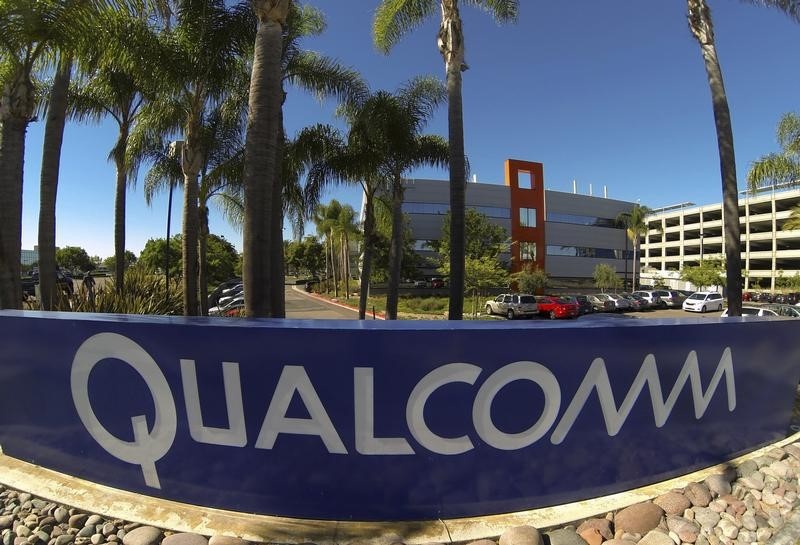By Noel Randewich and Matthew Miller
SAN FRANCISCO/BEIJING (Reuters) - The settlement of China's anti-trust probe into Qualcomm Inc is likely to intensify global scrutiny of the firm's highly profitable patent licensing business, and may even call into question its worldwide contracts with smartphone makers such as Apple and Samsung.
China's National Development and Reform Commission (NDRC) is moving to wrap up its 13-month investigation into the U.S. chipmaker as soon as possible, the regulator said in a statement on Friday, bringing to an end one of the most high profile of a slew of such investigations by Beijing into western firms.
Any deal is likely to include a record-breaking fine, as well as changes to how Qualcomm licenses its technology to handset makers in China, according to industry sources and local press reports.
That could weaken the firm's prized technology-licensing business across the global smartphone industry by increasing pressure from regulators in other countries. Anti-trust probes in Europe and by the U.S. Federal Trade Commission (FTC) may be related to China's investigation, Qualcomm has said.
"It's not an overstatement to say they're under attack," said Thomas Cotter, a patent expert and professor at the University of Minnesota Law School. "Nobody knows how it will play out but the fact that there is an FTC investigation tells you something."
Qualcomm declined to comment.
ROYALTY CHANGES
Qualcomm is the top patent holder for cellphone technology, including many that form industry standards like CDMA and LTE. Charging royalties based on the cellphones' selling prices, even those made with competitors' chips, provided more than half of its $8 billion (5.14 billion pounds) net income in 2014.
As growth tapers in developed markets, the smartphone industry has turned to China, where the rollout of LTE technology is driving demand, and where the majority of the world's smartphones are also manufactured.
The NDRC, one of China's anti-trust regulators, has said it suspects Qualcomm of overcharging and abusing its market position in wireless communication standards.
Qualcomm is expected by industry sources to agree to changes in how it charges royalties on cellphones sold in China, which will hurt its bottom line in its fastest-growing and most significant market.
Qualcomm earned about half of its global revenue of $26.5 billion in China for the fiscal year ended Sept. 28.
An agreement to lower royalty rates charged by Qualcomm on phones sold in China could affect its contractual relationships not just with local manufacturers such as Huawei, Lenovo, ZTE and Xiaomi Inc, but also with bigger global players that make and sell phones in China, such as Apple Inc. and Samsung Electronics, said patent lawyers consulted by Reuters.
At a meeting with analysts in November, Qualcomm President Derek Aberle did not directly answer a question about when the chipmaker's largest licensees' contracts would be due for renegotiation, or how those renegotiations would be affected by potential concessions Qualcomm could make in China.
"If Qualcomm comes to an agreement with China's government to materially reduce its royalty rates, then what happens with their agreements with LG, Samsung and Apple?" said Ascendiant Capital analyst Cody Acree. "It becomes a snowball that's really hard to see the end to."
ON THE BACK FOOT
The China probe is the latest anti-trust investigation faced by Qualcomm, which was hit with a $20 million fine in South Korea in 2009 and was forced to renegotiate licensing agreements with Nokia and others by the European Commission in 2007.
Recent decisions by Supreme Court judges making it harder to enforce software patents, as well as the possibility of a renewed push in Washington for patent reform, now have the San Diego company on the defensive at home, some patent experts believe.
The FTC's probe concerns patents on technology used in industry standards and might require Qualcomm to change its licensing practices, according to a company filing.

"Qualcomm has more problems than just in China," said Donald Merino, who advises companies on patents in Asia. "They have a problem in the US as well because the U.S. is devaluing the patent system."
(Editing by Alex Richardson)